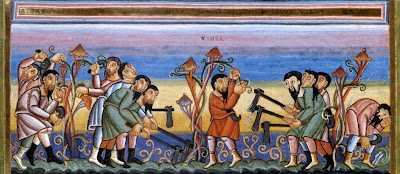Bishop Jack brings the propers together. His sermon is below the propers and can be viewed on video HERE -> https://youtu.be/Xp5_NrDuJ5s
Bishop Jack’s sermon looks at the unifying message of the Collect, Epistle and Gospel and examine how they share the common message of action as we celebrate the revealing of our Lord to the world. In the Collect, we ask God who knows we should be “…justly punished for our offences, may be mercifully delivered by thy goodness, for the glory of thy Name; through Jesus Christ our Saviour …” To get into heaven we need to be accounted as perfect. The answer is in the sermon. What Paul speaks of in his Epistle is the great reward we receive for holding steady to that course which God has set for us. The Gospel for today, the very important parable of the vineyard, also gives us very good advice on the conduct of our daily lives and contains a crucial key to happiness. Tbere is also a lesson for interacting with others as the join the Army of God. Action, not diction is what counts. It all comes together.
The Propers for today are found on Page 118-120, with the Collect first:
The Sunday called Septuagesima, or the
third Sunday before Lent.
The Collect.
LORD, we beseech thee favourably to hear the prayers of thy people; that we, who are justly punished for our offences, may be mercifully delivered by thy goodness, for the glory of thy Name; through Jesus Christ our Saviour, who liveth and reigneth with thee and the Holy Ghost ever, one God, world without end. Amen.
The Epistle for today came from the Ninth Chapter of the first letter of Saint Paul to the Corinthians beginning at the Twenty-Fourth Verse. Paul tells us that we must strive for mastery over ourselves so that we can gain the crown of eternal life offered us at great cost by our Lord Jesus Christ. We must each do our own personal best to control our own actions and behavior so we can follow God’s Plan for each of us. We must be bold and certain in our actions.
NOW ye not that they which run in a race run all, but one receiveth the prize? So run, that ye may obtain. And every man that striveth for the mastery is temperate in all things. Now they do it to obtain a corruptible crown; but we an incorruptible. I therefore so run, not as uncertainly; so fight I, not as one that beateth the air: but I keep under my body, and bring it into subjection; lest that by any means, when I have preached to others, I myself should be a castaway.
The Holy Gospel for today came from the Twentieth Chapter of the Gospel of Saint Matthew beginning at the First Verse. Often quoted, this is the very important parable of the vineyard. While it appears to be principally directed towards Christians wanting to be “first” in importance and the like, it has a more direct meaning. It is a fine lesson in “buyer’s remorse” or coveting of jobs or similar concepts. If you got a good deal, it does not change because someone else got a “better” deal. Take what you got, go forth and be happy. Other meanings abound. For a very direct application, what this means is “cradle” Christians are no more likely to go to heaven than this morning’s convert. They just get to enjoy the Christian experience longer. One note, if you wait until the last minute to join the gang, your time here might end before you get around to it.
Sometimes people act like being a Christian is an unpleasant experience that they will do when they get a round tuit. It is not. Christians aren’t perfect, they just have more fun being imperfect and imperfectly trying to improve! Anyway, here is the Gospel according to Saint Matthew:
HE kingdom of heaven is like unto a man that is an householder, which went out early in the morning to hire labourers into his vineyard. And when he had agreed with the labourers for a penny a day, he sent them into his vineyard. And he went out about the third hour, and saw others standing idle in the marketplace, and said unto them; Go ye also into the vineyard, and whatsoever is right I will give you. And they went their way. Again he went out about the sixth and ninth hour, and did likewise. And about the eleventh hour he went out, and found others standing idle, and saith unto them, Why stand ye here all the day idle? They say unto him, Because no man hath hired us. He saith unto them, Go ye also into the vineyard; and whatsoever is right, that shall ye receive. So when even was come, the lord of the vineyard saith unto his steward, Call the labourers, and give them their hire, beginning from the last unto the first. And when they came that were hired about the eleventh hour, they received every man a penny. But when the first came, they supposed that they should have received more; and they likewise received every man a penny. And when they had received it, they murmured against the goodman of the house, saying, These last have wrought but one hour, and thou hast made them equal unto us, which have borne the burden and heat of the day. But he answered one of them, and said, Friend, I do thee no wrong: didst not thou agree with me for a penny? Take that thine is, and go thy way: I will give unto this last, even as unto thee. Is it not lawful for me to do what will with mine own? Is thine eye evil, because I am good? So the last shall be first, and the first last: for many be called, but few chosen.
Sermon - Bishop Jack Arnold
Anglican Orthodox Church of the United States
Training and Education Department
Diocese of the West
Church of the Faithful Centurion - Descanso, California
Today’s sermon brought the Collect, Epistle and Gospel together because as is always the case there is a unifying message in the Scripture for this Sunday. Bp Jack’s sermon can be viewed on video HERE ->https://youtu.be/Xp5_NrDuJ5s
Good morning! I hope you are all doing well. In today’s sermon we will be looking at the unifying message of the Collect, Epistle and Gospel and examine how they share the common message of action as we celebrate the revealing of our Lord to the world. Let us start by reading today’s Collect:
The Sunday called Septuagesima, or the
third Sunday before Lent.
The Collect.
LORD, we beseech thee favourably to hear the prayers of thy people; that we, who are justly punished for our offences, may be mercifully delivered by thy goodness, for the glory of thy Name; through Jesus Christ our Saviour, who liveth and reigneth with thee and the Holy Ghost ever, one God, world without end. Amen.
Think about these words:
… we, who are justly punished for our offences, may be mercifully delivered by thy goodness …
In the Collect, we ask God who knows we should be “…justly punished for our offences, may be mercifully delivered by thy goodness, for the glory of thy Name; through Jesus Christ our Saviour …” To get into heaven we need to be accounted as perfect. Yet, we cannot be “cured” of sin nor “improved” to perfection. So how do we solve this irregularity? We know we ourselves cannot solve our dilemma. Who can? There is a solution for us! Consider the words of John Newton near the end of his life, “Although my memory's fading, I remember two things very clearly: I am a great sinner and Christ is a great Savior!” The answer lies in the latter part of Newton’s quote. Jesus is the answer to this great dilemma. Our sins would be justly punished by eternal damnation, yet there is hope in our Lord. He brought us this hope by His Death upon the Cross and delivered it in the Resurrection. Without His Sacrifice one time for all mankind, there would be no hope for our eternal future. But Jesus is our hope for that eternal future. It was this goodness that the collect talks about, His Sacrifice that has delivered us from our just punishment of eternal death. Now that we have been delivered, we just have to do our best to follow His commandments and to stay the course He has set for our lives.
What Paul speaks of in his Epistle is the great reward we receive for holding steady to that course which God has set for us. For eternal salvation is the delivery promised to each of us by Jesus. God does not promise us an easy life here on Earth, there will be many trials and tribulations set before us. These obstacles are all part of the race that we have to run. But while running the race, we have to remember the reward for holding steady to that course will make undergoing all the trials and tribulations worth it. We will undergo many triumphs and tribulations, we will make mistakes (some bigger than others, hopefully non life altering) and learn from them, our life will ebb and flow like the waves but as long as we stay the course, then all will be well.
Make no mistake, like a marathon, this run requires frequent training in the Scriptures and acting upon the concepts in Scriptures. And like marathon runners, we receive a wonderful prize. Unlike marathon runners in which only the top few get the prize, it is available to us that run and successfully complete the race (by holding true to the concepts in scripture) However, it is a prize that has value beyond anything on Earth. The prize is for the promise of an eternal, unending life, to be spent with our Lord and Savior Jesus. It is for the promise of a world unaffected by the tarnish of sin, unblackened by the sinful deeds of imperfect beings. It is an unshadowed world. It shall be true happiness at last, to meet with our beloved family, our Christian heavenly family, friends and beloved pets.
Eternal salvation is a far more priceless treasure than anything we could acquire on Earth, truly priceless except for the death of our Saviour and resurrection. That is the only price involved with our eternal freedom. As the saying goes, there is no free lunch. Eternal life does not come to us without cost. The cost was Jesus’ one time sacrifice for all time for all mankind. Keep the eyes on the prize, as it were! And realize that prize does not come free. We have to run the race set before us and follow Jesus in order to receive our prize of eternal life. We have to be constantly focusing on this fact.
When times get really hard, and it is tempting to give up sometimes; that is when we must redouble our efforts and focus our end goal, remaining on the path towards Heaven. There will be times when we get very discouraged but we must not give up! We must remember the reward we will receive in the end and keep our eyes focused on our goal of finishing the race that is set before us.
Our eyes should be focused on the finish line, not our “competition.” We have a tendency to compare ourselves to the competition but in this case it is not helpful. Comparing ourselves to others gains us nothing. What we really need to do instead is to focus on how we are doing and compare it to the guidebook of Holy Scriptures and evaluate our performance. The Holy Scriptures are a much better comparison point and will paint us a more accurate picture of our performance and compliance or non compliance with Scripture. If we are lacking, we just make the needed adjustments until we are in compliance with scriptures.
So how do we run the race?
With our eyes focused tightly on the finish line, not on those around us, wondering are they doing ‘better’ than we are? That is not a useful question. Christianity is not about competition, about bbetingeing other people to the finish line. In fact, it is about helping others around us to the finish line to the best of our abilities, if they are willing to let us help them.
The useful question is, “Am I doing the best I can?” We have to answer that question; if we are not doing our best, then we need to change it. Think of how we can do our best and then set our course to do that. And, we must remember this is a Team Effort. We have to want to win, and in order to win the race set before us; we have to perform actions. Action must first start with our neighbors and work our way outward. We cannot affect the whole world, but if we each work together on our part of the world and work for their, we can change the world. However, it must be a team effort, we cannot all do it alone. We need each and every person in our Team to put aside any potential grudges and work together for Him so that we can advance His Cause here on Earth.
How do we ensure we are in compliance with Scriptures after we read them? Action of course! Acting is the best visible proof to others that we do indeed have faith. Faith without any sort of actions is a false faith. But if we have faith with action backing it up then we have the true faith. It is not good enough to just read the Word, we need to read what the Word says and then put it into action in our own lives.
The Gospel for today, the very important parable of the vineyard, also gives us very good advice on the conduct of our daily lives and contains a crucial key to happiness. There is the lesson that the deathbed conversion gains the same prize of eternal life as the lifelong follower, but there is a lot more in it for everyday life. A person who comes to Christ late in life receives the same eternal benefits as a person who followed Christ from the age of reason. And that there is no need for any jealousy between a lifelong Christian and one who comes to Christ late in life. They both will receive the same reward for following Christ if they stay the course, so there should be no reason for the life long Christian to lord how long he has been a Christian over the other person.
It is a fine lesson in “buyer’s remorse” or coveting of jobs or similar concepts. If you got a good deal, it does not change because someone else got a “better” deal. Take what you got, go forth and be happy. Don’t complain because somebody else got the same deal as you did sooner. One meaning of this parable is that “cradle” Christians are no more likely to go to heaven than this morning’s convert. They just get to enjoy the Christian experience longer. However, you should not wait until the last minute to join the gang, your time here might end before you get around to it. So, don’t wait until tomorrow to act, do it today while you still have time!
Sometimes people act like being a Christian is an unpleasant experience that they will do when they get a round TUIT. It is not. Christians aren’t perfect, they just have more fun being imperfect and imperfectly trying to improve!
Christ gave us eternal life. But, we have to accept it. Once you accept it, start living as if you will live forever. You will; and you will have to live with your actions forever! So, Act early and Act often!
There is but one way to heaven.
That easy to find, easy to follow, easy to hike downhill path does not lead to the summit where eternal life in the real world awaits. Open your heart to the Holy Ghost, use His Power to follow our Lord to God who awaits in heaven.
Heaven is at the end of an uphill trail. The easy downhill trail does not lead to the summit.
The time is now, not tomorrow. The time has come, indeed. How will you ACT?
It is by our actions we are known.
Be of God - Live of God - Act of God











